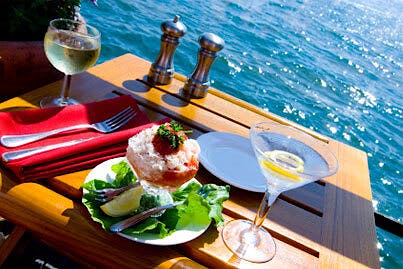
One of the most enjoyable parts of a holiday is trying different foods, indulging in meals out, and treating ourselves.
There is no reason why you should not enjoy all these things — but try to do so in moderation. A wonderful holiday could be ruined by eating or drinking too much, or making unhealthy choices.
Heart Health ¶
The Mediterranean diet — rich in olive oil and fresh fish and vegetables — is known to be very good for the heart. Try to choose foods that are grilled, baked, or roasted, to minimise the extra cholesterol that you will eat.
Salt levels will be especially high in cured meats, fried foods, and may be added to sauces for stews and curries, so keep these to a minimum. Try not to add salt to your food, and avoid creamy sauces.
Diabetes and Diet ¶
Stick to healthy rice, pasta and potato dishes, with fish or meat preferably grilled rather than fried. By all means enjoy a dessert or an ice cream, but try to make this a treat rather than a daily occurrence!
There is a huge amount of sugar in alcoholic drinks too – so keep these to a minimum, make sure you choose sugar free mixers and steer clear of creamy cocktails.
Healthy Snacks ¶
Try to choose olives, fruit or water as snacks during the day. Crisps, bread and nuts are high in fat, and often salt too, and should be kept to a minimum.
It is best to opt for peelable fruits — such as bananas, melon, pineapple, and oranges — rather than apples and berries. This reduces the chance of developing food poisoning. Make sure you wash fruit and vegetables before eating or cooking them.
Drinking ¶
I would recommend drinking bottled water on holiday, as a change in tap water can upset your stomach, even if it is clean and safe to drink. If you are concerned about the cleanliness of the tap water, it is best to avoid ice in drinks too.
Try to drink more water than normal — especially in a hot climate. You should aim for about 2 litres a day. Juices and squashes can contribute to this amount.
Coffee and tea can dehydrate you, so keep them to a minimum. Alcohol is also a big cause of dehydration abroad, and you may be more sensitive to alcohol when in a hot environment.
Try alternating alcoholic drinks with a glass of water, avoid drinking in the day, and try not to drink more than the recommended units per week( 14 units for a woman, 21 units for a man). 14 units is about 1 and a half bottles of wine, and 21 units is about 8 pints of beer. Alcohol measures may be larger abroad, and beware the amount of alcohol in cocktails and liquers. You may end up drinking more than you think.
About Dr Ruth Handford ¶
Dr Ruth Handford is a GP with over 10 years' experience of working in both hospital and primary care. She is particularly interested in caring for the elderly in the community, child health, and family planning. Ruth lives and works in a rural community, and is kept very busy by her job and young family.
Important Information: These travel tips are intended to provide general information and do not replace a visit to your doctor. If you are planning a holiday you should consult your doctor to ensure that you are fit to travel and discuss any specific health requirements you may have.
Travel Insurance for Medical Conditions ¶
The Foreign and Commonwealth Office recommend that you have travel insurance in place every time you travel abroad. Make sure that your travel insurance covers any medical conditions you may have.
Goodtogoinsurance.com is proud to be able to provide cover for all types of medical conditions including heart problems, cancer, diabetes and arthritis.
